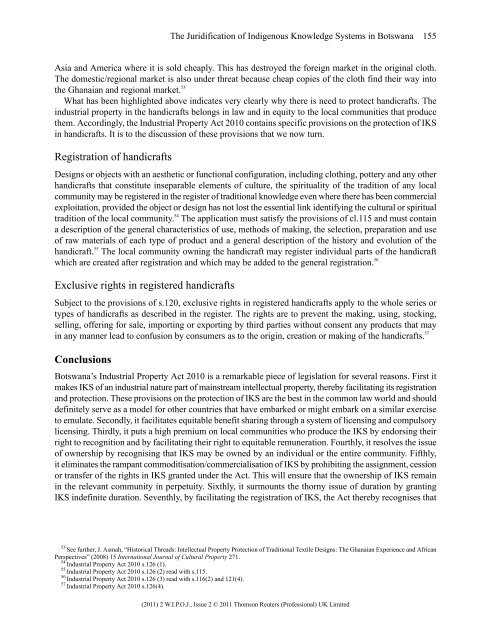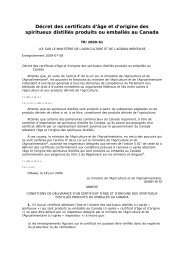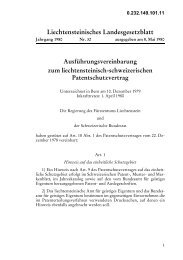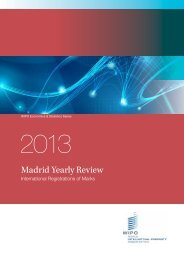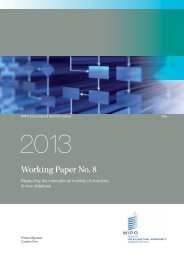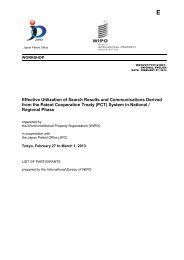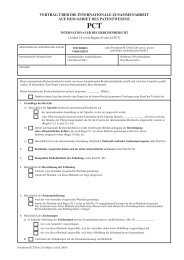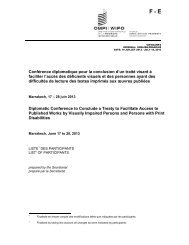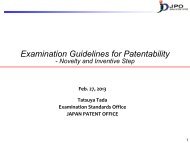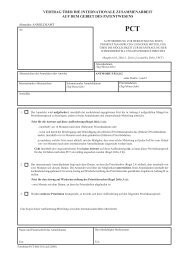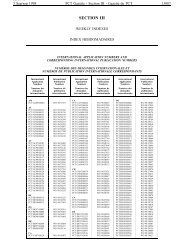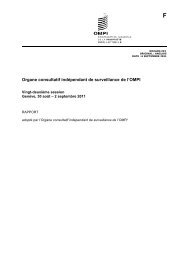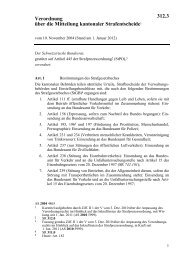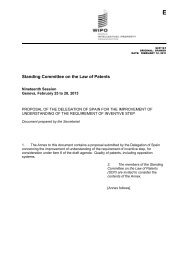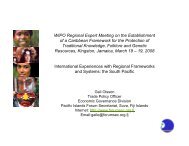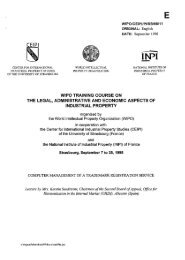WIPO Journal - World Intellectual Property Organization
WIPO Journal - World Intellectual Property Organization
WIPO Journal - World Intellectual Property Organization
Create successful ePaper yourself
Turn your PDF publications into a flip-book with our unique Google optimized e-Paper software.
Asia and America where it is sold cheaply. This has destroyed the foreign market in the original cloth.<br />
The domestic/regional market is also under threat because cheap copies of the cloth find their way into<br />
the Ghanaian and regional market. 53<br />
What has been highlighted above indicates very clearly why there is need to protect handicrafts. The<br />
industrial property in the handicrafts belongs in law and in equity to the local communities that produce<br />
them. Accordingly, the Industrial <strong>Property</strong> Act 2010 contains specific provisions on the protection of IKS<br />
in handicrafts. It is to the discussion of these provisions that we now turn.<br />
Registration of handicrafts<br />
Designs or objects with an aesthetic or functional configuration, including clothing, pottery and any other<br />
handicrafts that constitute inseparable elements of culture, the spirituality of the tradition of any local<br />
community may be registered in the register of traditional knowledge even where there has been commercial<br />
exploitation, provided the object or design has not lost the essential link identifying the cultural or spiritual<br />
tradition of the local community. 54 The application must satisfy the provisions of cl.115 and must contain<br />
a description of the general characteristics of use, methods of making, the selection, preparation and use<br />
of raw materials of each type of product and a general description of the history and evolution of the<br />
handicraft. 55 The local community owning the handicraft may register individual parts of the handicraft<br />
which are created after registration and which may be added to the general registration. 56<br />
Exclusive rights in registered handicrafts<br />
Subject to the provisions of s.120, exclusive rights in registered handicrafts apply to the whole series or<br />
types of handicrafts as described in the register. The rights are to prevent the making, using, stocking,<br />
selling, offering for sale, importing or exporting by third parties without consent any products that may<br />
in any manner lead to confusion by consumers as to the origin, creation or making of the handicrafts. 57<br />
Conclusions<br />
Botswana’s Industrial <strong>Property</strong> Act 2010 is a remarkable piece of legislation for several reasons. First it<br />
makes IKS of an industrial nature part of mainstream intellectual property, thereby facilitating its registration<br />
and protection. These provisions on the protection of IKS are the best in the common law world and should<br />
definitely serve as a model for other countries that have embarked or might embark on a similar exercise<br />
to emulate. Secondly, it facilitates equitable benefit sharing through a system of licensing and compulsory<br />
licensing. Thirdly, it puts a high premium on local communities who produce the IKS by endorsing their<br />
right to recognition and by facilitating their right to equitable remuneration. Fourthly, it resolves the issue<br />
of ownership by recognising that IKS may be owned by an individual or the entire community. Fifthly,<br />
it eliminates the rampant commoditisation/commercialisation of IKS by prohibiting the assignment, cession<br />
or transfer of the rights in IKS granted under the Act. This will ensure that the ownership of IKS remain<br />
in the relevant community in perpetuity. Sixthly, it surmounts the thorny issue of duration by granting<br />
IKS indefinite duration. Seventhly, by facilitating the registration of IKS, the Act thereby recognises that<br />
53 See further, J. Asmah, “Historical Threads: <strong>Intellectual</strong> <strong>Property</strong> Protection of Traditional Textile Designs: The Ghanaian Experience and African<br />
Perspectives” (2008) 15 International <strong>Journal</strong> of Cultural <strong>Property</strong> 271.<br />
54 Industrial <strong>Property</strong> Act 2010 s.126 (1).<br />
55 Industrial <strong>Property</strong> Act 2010 s.126 (2) read with s.115.<br />
56 Industrial <strong>Property</strong> Act 2010 s.126 (3) read with s.116(2) and 121(4).<br />
57 Industrial <strong>Property</strong> Act 2010 s.126(4).<br />
The Juridification of Indigenous Knowledge Systems in Botswana 155<br />
(2011) 2 W.I.P.O.J., Issue 2 © 2011 Thomson Reuters (Professional) UK Limited


